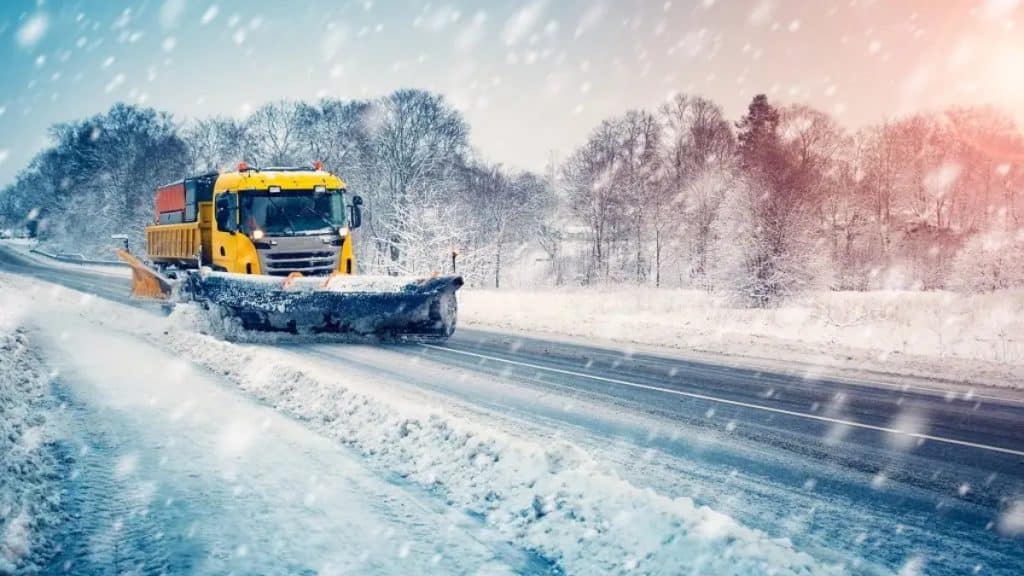We all know driving a car is both a luxury and a privilege. Though we might not think about it much, professional experts are responsible for maintaining the roads and highways around us. When bad weather hits, these teams act quickly to clear the icy roads for safety.
In winter, you need a full team of snow removal experts because cold weather creates ice, which makes driving dangerous. Many cities and towns have specific road maintenance procedures, while homeowners and citizens look after their own driveways and street sections.
Here are some common winter road maintenance practices that many municipalities follow.
Weather Watching
It’s easy to track weather events online. Your team is alerted to prepare for severe weather. Before imminent bad weather, you should spray salt brine on the roads to prevent icing. Salt brine is mixed with rock salt and water. Snow sticks less to the road because it freezes at a low temperature. Calcium and magnesium chloride can also be used.
Salt brine can be sprayed up to 16 hours before snowfall. It works by melting snow as soon as it falls. Sometimes, heavy snowfall can be overwhelming. However, even when snow piles up on top, the road surface still melts the layers underneath, making it easier to clear.
Snow Removal
Once the snow accumulates, trucks are ready to remove it. Trucks are equipped with plows to divert snow to the side of the road, and they will make several passes along a route according to their plan. Major roads are cleared, followed by side streets and gravel roads. Other trucks may come along to spread salt and sand, but some snowplough vehicles can do both.
Salt and Sand
As mentioned above, salting and sanding are effective ways to break down snow and ice and aid trucks in clearing snow and ice with their plows. Salt brine for roads is more effective than sand because it reacts with snow to melt. Sand is more for displacement and traction; a mix of both is often used for a double-punch effect.
Pre-Treating Roads Before a Storm
Preparing surfaces before a storm is one of the best ways to deal with dangerous winter roads. This means putting de-icing products, like salt brine or other chemicals, on roads before snow or ice arrives. This smart step helps stop snow from sticking to the pavement and cuts down on black ice. This makes it easier to clear snow when it falls.
Pre-treating helps in places with lots of snow since it reduces how much ice and snow stick to roads at first. City workers and road crews closely monitor weather forecasts to ensure de-icing products go down at the right time.
Ongoing Road Work
Weather events continue to be monitored, and trucks are dispatched to targeted locations to remove snow and ice. Removal and clean-up are ongoing to keep up with accumulation. When new snow falls, plows remove it, and salting and sanding follow up.
Once the snow dissipates and the weather event is over, the work doesn’t stop. Freezing temperatures keep the ice in play, so more salting and sanding continue until the roads are safe and free to navigate.
Personal Road Surfaces
Not all roads are taken care of by your city or community. If you’re a private driver needing road maintenance, you’ll have to handle it independently. This also applies to your driveway and personal roads. Check out your local home improvement store or a company that sells de-icing and road maintenance products to find what you need.
Their staff can help you choose the right products to clear your roads and prepare for winter. You can also hire local companies to do the work, as they have the equipment and products to keep things safe and clear.
Seasonal Maintenance
All snow and ice removal equipment is ready for winter, and dedicated staff work hard to make the roads safe. Once the seasons change and the weather improves, all vehicles are run through shops for full repair and maintenance checks. Once tuned up, they are parked away for the next cold season.
These are good practices for winter road maintenance. Knowing what is put into keeping our roads safe during winter helps you appreciate the hard work of those who brave the cold nights. Next time you see them, thank them for their dedication to making our roads safe for everyone.
